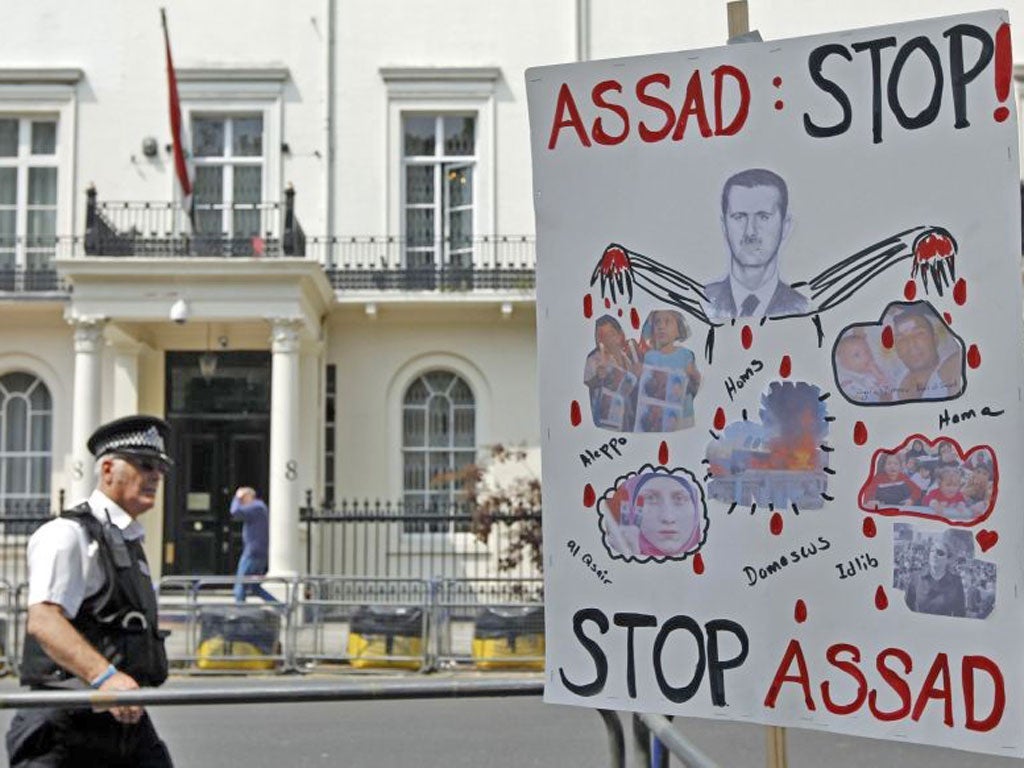Assad's top man in London goes into hiding in protest at regime's bloodshed

Syria's most senior diplomat in Britain yesterday quit his post in protest at the continued bloodletting by President Bashar al-Assad's regime, in the latest in a slew of diplomatic defections.
The Foreign Office said the charge d'affaires Khaled al-Ayoubi had informed them yesterday morning of his decision and was now at a "safe location" within the UK. He has not yet announced whether he will join the opposition, and is understood to be considering his next move.
"Mr al-Ayoubi has told us that he is no longer willing to represent a regime that has committed such violent and oppressive acts against its own people," a spokeswoman said.
His departure is another blow to the Assad regime. It illustrates the revulsion and despair the regime's actions are provoking among Syrians from all walks of life, inside the country and abroad.
Mr al-Ayoubi joined the Syrian diplomatic service in 2001 and was posted to London on 18 February last year, where he is believed to have joined the embassy as a second secretary. Only three junior diplomats now remain at the embassy.
The previous charge d'affaires, Ghassan Dalla, was expelled in May following the Houla massacre, and ambassador Sami Khiyami was recalled in March after Britain closed its embassy in Damascus.
Several senior diplomats have defected in recent weeks, including envoys in Iraq and Cyprus.
"We urge others around Bashar Al-Assad to follow Mr al-Ayoubi's example; to dissociate themselves from the crimes being committed against the Syrian people and to support a peaceful and free future for Syria," the Foreign Office said.
The deputy police chief of Latakia city also defected and fled to Turkey overnight with 11 other Syrian officers, a Turkish official said. Another 600 Syrians had arrived in the last 24 hours, bringing the number of Syrian refugees in Turkey to around 43,500.
Amid growing concern about security on its southern frontier, Turkey sent a convoy of troops, missile batteries and armoured vehicles to the border with Syria yesterday.
On the ground, Syrian rebels put forward a roadmap for the transition period after the fall of President Assad, taking a swipe at opposition figures outside of the country who are attempting to do the same.
The "national salvation draft", penned by the Homs-based Free Syrian Army (FSA) Military Council Joint Command, calls for the creation of military and civilian bodies which would lead to the creation of an executive council providing a "backbone" for the transition.
The plan, circulated by Colonel Qassim Saadeddine, follows last week's meeting of the main external opposition group, the Syrian National Council, to determine plans for a transitional government.
In a warning that seemed directly aimed at those efforts, the FSA said "any government that is created anywhere... that lacks national and revolutionary legitimacy.. and that lacks the approval of the Joint Command and all the revolutionary forces on the ground, will not see the light".
Col Saadeddine has denounced the leadership of Col Riad al-Asaad, who is not related to the president but seen by many as the FSA's leader. Analysts and Western diplomats have said the opposition based outside the country is likely to become increasingly irrelevant in the coming months, as more developed power structures emerge.
The first step on the FSA's roadmap is establishing a higher defence council which would be drawn from the country's military councils and senior defectors. That body would be responsible for creating a presidential council and a six member executive council.
Join our commenting forum
Join thought-provoking conversations, follow other Independent readers and see their replies
Comments
Bookmark popover
Removed from bookmarks